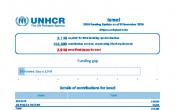Israel
Operation: Israel
Location
{"longitude":35,"latitude":33,"zoom_level":7}
Latest update of camps and office locations 21 Nov 2016. By clicking on the icons on the map, additional information is displayed.
Key Figures
| 2017 planning figures | |
| 5,000 | people of concern with specific needs will be supported through advocacy, legal or medical/psycho social interventions |
| 200 | people of concern will receive skills training for livelihood purposes |
| 200 | refugees will be submitted for resettlement |
| 50 | community members will be trained in SGBV prevention and response |
| 22 | community groups will be supported to allow them to better advocate for their needs |
| 2015 end-year results | |
| 7,000 | asylum claims filed by Eritreans and Sudanese |
| 4,589 | people of concern to UNHCR with specific needs receiving support |
| 2,136 | asylum-seekers’ needs mapped and counselled (211 in detention) |
| 1,192 | asylum-seekers provided with legal assistance |
| 730 | Eritreans and Sudanese in 33 HIV prevention workshops; 7,000 street “spontaneous conversations” on HIV/AIDS by awareness raising team |
| 168 | cases submitted for resettlement |
People of Concern
0%
Decrease in
2015
2015
| 2015 | 45,106 |
| 2014 | 45,284 |
| 2013 | 56,228 |

[["Refugees",361],["Refugee-like situation",38139],["Asylum-seekers",6591],["Stateless",15]]
Loading ...
Budgets and Expenditure for Israel
< Back
2015
{"categories":[2012,2013,2014,2015,2016,2017],"budget":[3.12954461,3.22276023,2.9347088,3.20793918,3.07990377,3.669781902],"expenditure":[2.27217866,2.86515197,2.6475354,2.75589838,null,null]}
{"categories":[2012,2013,2014,2015,2016,2017],"p1":[3.12954461,3.22276023,2.9347088,3.20793918,3.07990377,3.669781902],"p2":[null,null,null,null,null,null],"p3":[null,null,null,null,null,null],"p4":[null,null,null,null,null,null]}
{"categories":[2012,2013,2014,2015,2016,2017],"p1":[2.27217866,2.86515197,2.6475354,2.75589838,null,null],"p2":[null,null,null,null,null,null],"p3":[null,null,null,null,null,null],"p4":[null,null,null,null,null,null]}
Loading ...
CHOOSE A YEAR
- 2015
- 2017
Working environment
Israel hosts more than 40,000 refugees and asylum-seekers, the majority of whom originate from Eritrea and Sudan. UNHCR maintains a constructive dialogue with the Ministry of the Interior to promote a more protective status and solutions for the refugees and asylum-seekers in Israel.The Government of Israel provides full and free access to primary and secondary education. To some degree, it supports pre and post-natal medical care for asylum-seeker women and newly-born babies. It also provides shelter and rehabilitation for recognized victims of trafficking. HIV-treatment, including medication and monitoring, is provided to the majority of affected asylum-seekers without health insurance. In addition, life-saving and critical support is delivered at the municipal level to assist some asylum-seeker children and families at risk.
Key priorities
Key priorities in Israel in 2017 include:• Implementing a pilot project within the framework of the Solutions Strategy which is subject to approval by the Minister of Interior. This project will allow improved protection for some 5,000 refugees in Israel, whereas another 1,670 refugees would find protection in third countries through resettlement or admission via humanitarian pathways;
• Reducing protection risks faced by asylum-seeker children (e.g. neglect, abuse, lack of proper birth documents) with a particular focus on newborns and age groups zero to three;
• Increasing the provision of age- and gender-sensitive services to persons of concern who have experienced abuse, violence and exploitation, with a particular focus on victims of torture, sexual orientation and gender identity (SOGI) asylum-seekers and single mothers;
• Advocacy and provision of medical, psycho-social and rehabilitative services to asylum-seekers with disabilities;
• Improved outreach to and engagement with communities to inform them of their basic rights and access to services;
• Interventions to promote the self-reliance of asylum-seekers, including through access to higher education, technical and vocational training;
• Targeted advocacy and media interventions to promote the acceptance of asylum-seekers.
The Office will continue to work with the authorities, UN agencies and civil society actors to pursue effective responses and to ensure adequate protection for asylum-seekers, including access to basic services and improved interactions between authorities, host communities and asylum-seekers.
The Office will seek to ensure continued funding for the implementation of the Solutions Strategy aimed at the strengthening of refugees and asylum seekers’ protection and access to solutions.

